The mentor–mentee relationship in medicine is a rapport between a more senior physician and a junior one, typically a medical student, resident, or early-career physician. The mentor can help the mentee improve his or her abilities and skills as a clinician by observing, assessing, modeling, and providing career guidance. A mentor is often one of the most valuable resources young physicians or students can have as they begin their journey into medicine.
So, how do the mentees know whether or not they’re on track? We asked three physicians about their current work and home lives, their career plans, and the advice they are following to plan successfully (“the mentees”). We then asked three more-senior physicians to comment on the mentees’ answers and use insight from their own lives to explain how they agree or disagree in their thinking (“the mentors”).
The first two of our mentees don’t have formal relationships with their commentators, but our final pairing has an established mentor–mentee relationship.
Resident and Faculty Member
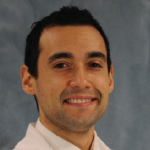
Dr. Vila
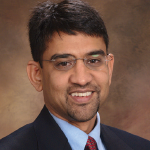
Dr. Das
Mentee: Peter M. Vila, MD, MSPH, is a resident and postdoctoral research fellow in the department of otolaryngology–head and neck surgery at Washington University School of Medicine in St. Louis, Mo.
Mentor: Subinoy Das, MD, is an otolaryngologist with Ohio ENT & Allergy Physicians in Columbus.
What is an example of a “little thing” in your relationship with your mentor that has made a lasting impact on you?
PV: The most effective mentors I have had during my training (early on in medical school, during my research years, and throughout residency training) have all made the effort to make me feel respected and valued. Even if I was doing something that they would have done differently, rather than write me off, they would take the time to explain why they might do it a different way. The best mentors have been careful to explain in a nonjudgmental way that perhaps they have been in a similar situation in the past, and that particular approach didn’t work for them. I think we tend to forget that we learn a monumental amount of information and wisdom as we progress through training, and it’s easy to forget just how far we’ve come from where we started, so we can sometimes assume that trainees know something that they have not learned yet.
As I now progress to teaching and mentoring junior residents and medical students, I am realizing just how much effort it takes to be patient and make people feel valued. I think everyone, no matter how senior, continues to learn and at times feel uncomfortable with situations they may not have encountered before, but handling them with respect and integrity separates the great mentors from the rest. Remembering to value trainees and respect their mistakes and learning without condescension is an important lesson, regardless of how one may have been treated in the past.
SD: I think Peter is wise beyond his years, and I completely agree with his response. From a mentor’s perspective, it is important for us to realize that we have been practicing surgery in some cases for many decades, while our mentees are relatively new in the field. This requires patience and vigilance. We need to break any cycles of abuse we were exposed to and treat our mentees with the utmost professionalism, compassion, and empathy and not feel entitled by the trials and tribulations of our own difficult training experiences.
What is the most important aspect of a mentor–mentee relationship?
PV: To say that the mentor–mentee relationship is “friendly” is probably not the right word, but there is certainly a large amount of mutual respect. With large differences in age and career stage between mentor and mentee, the expectation is not that the two will be chummy with each other, but in an effective mentor/mentee relationship, the mentee should feel at ease and free to [express] his or her opinions without fear of judgment or retribution. I would consider personal and professional relationships at two ends of the spectrum: The personal interactions are all about non-work activities, the professional relationships are about the job and career, and the mentor/mentee relationship is probably somewhere in between (although skewed more toward the professional side in the beginning).
SD: I think the most important aspect for a healthy mentor–mentee relationship is for the mentor to realize that he or she is primarily performing an act of service that, in most cases, will not be reciprocally beneficial, but will be paid forward and will benefit our posterity. Mentors who are searching for apprentices or an immediate return on investment for their efforts are likely to grow disillusioned and abandon efforts in long-term mentoring and the tremendously valuable intrinsic rewards that come from such an act of service.
The most important aspect for a healthy mentor–mentee relationship is for the mentor to realize that he or she is primarily performing an act of service that, in most cases, will not be reciprocally beneficial, but will be paid forward and will benefit our posterity. —Subinoy Das, MD
How do you prioritize the various professional and personal demands in your life?
PV: With a new baby at home, in addition to interviewing for fellowship while maintaining my duties at a busy residency program, this has certainly been a moving target over the past few months. I am not sure there is one strategy that will work for everyone, but I think accepting that free time is a luxury to be managed with the utmost care, and setting discrete goals, is helpful. More than anything else, having responsibilities pull me in multiple directions has forced me to prioritize and cut out the non-essential activities that don’t add much value. Figuring out what my goals are has helped me to figure out which activities contribute toward and, more importantly, do not contribute toward achieving these goals.
SD: Young physicians need to continue to learn to say no nicely and, in some cases, disappoint their mentors through pursuits that appeal to their own self-
interest and not necessarily their external expectations. This might mean reallocating more time in your week for your family/hobbies/sleep instead of your career, or vice versa; everyone should pursue their own formula and recipe for happiness, which will be unique. In the end, success must be a personal reflection. Aiming to meet an external definition of success is likely doomed for failure. For me, as I’ve grown older, success becomes less defined by traditional norms, such as CV development, wealth accumulation, professional awards, leadership roles, and recognition, etc., and more so by seeing my children work hard and accomplish a good grade in school or do well in some sporting event, seeing my patients get healthier regardless of where the medical intervention came from, and seeing specific areas where a devotion to life-long learning creates a positive impact in my daily life.
Junior Faculty and Senior Faculty
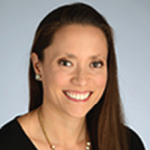
Dr. Villwock
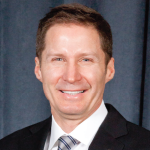
Dr. Smith
Mentee: Jennifer Villwock, MD, is assistant professor of otolaryngology–head and neck surgery in the division of rhinology and skull base surgery at University of Kansas Medical Center in Kansas City.
Mentor: Tim Smith, MD, MPH, is director of the Oregon Sinus Center at the Oregon Health and Sciences University in Portland.
What is an example of a “little thing” in your relationship with your mentor that has made a lasting impact on you?
JV: There are multiple “little things” that come to mind. They all have a common theme of integrity in action. When I was interviewing for fellowship with Alex Chiu, MD, it was explained to me that he would not be at the interview dinner as he had family commitments. We had talked earlier in the day about the importance of endeavoring toward a healthy level of work-life integration and how that may change longitudinally over the course of a career. It was meaningful to see his actions reflect that conversation; it also helped me give myself permission to set similar priorities for myself.
TS: After reading Jennifer’s response, I realize it took me many years to find the balance (an ongoing struggle for me) Dr. Chiu demonstrated in his actions. It is important to realize that the mentor is a flawed individual upon whom many positive projections have been cast by mentees. While interacting with our mentees, we need to embrace our flaws and shine light on them. These flaws are opportunities for our mentees to succeed where we have failed. I’ve learned to look at my mentee as a whole person, not just at their professional ambitions and career. My important mentors showed me that authenticity while mentoring is critical.
What is the most important aspect of a mentor–mentee relationship?
JV: The part that is most important to me is having a person who has been where I have been, but also has the added perspective of time and experience to help guide my trajectory. I sometimes struggle with the “big picture,” such as how to turn a solid research idea into a longitudinal and fundable project or choosing opportunities to best improve my skill set and further define and develop my academic niche. I think it’s also important that my mentor is not trying to make a carbon copy of himself. When you Google image search “mentor,” often a picture [appears] of someone at the top of a mountain, reaching a hand down to pull another climber up. I think the relationship should, instead, be that of a climber (mentee) and the person belaying her (mentor). The belayer can often see a potential route or next step that the climber cannot. The belayer is not there to use his might to single-handedly hoist the climber up or dictate which hand- and footholds to use next. Rather, he protects the climber from injury, allows for respite and rethinking when trouble is encountered, and then perhaps shows the climber that it can be done, and encourages the climber to find her own best route.
This relationship differs from other professional relationships because of an increased level of authenticity. As a young faculty member, I can feel pressure (from myself) to try to always put my best foot forward. The faculty in my department have been immensely kind and supportive, and I know that I have been very well trained, but I do struggle with impostor syndrome. Sometimes this means that I am actively trying to exude more confidence than I feel or that I [feel I] should be smarter, stronger, faster in particular moments. With my mentors, I feel that I can drop any semblance of a charade and be completely honest. If I am struggling, I can say so without fear of judgment and start to work through, over, or around whatever the stumbling block is. Some of my most meaningful moments with mentors have been connecting over struggles
TS: I’ve learned to help my mentees find their way, not my way. I’ve worked hard to embrace the ego-challenging concept of reflecting accolades toward your mentees rather than accruing them for my own satisfaction. My relationship to my mentees and to my most impactful mentors is more like a personal relationship than a professional relationship. They really know me and my personal sufferings and my real struggles, and I know some of theirs. There is no way to do what I do without the personal getting mixed in with the professional, within reasonable boundaries. When I am more human, I feel I’m always in a better position to offer and receive counsel.
How do you prioritize the various professional and personal demands in your life?
JV: I used to think that success meant looking like other successful people, doing the things these successful people do, etc. Over time, I’ve realized that this can be quite counterproductive. Does the person I’m trying to imitate have a life/values/reality similar to mine? Do I actually want my life to resemble theirs? My version of success is going to be specific to me and includes, among other things, happiness. Cheesy as it sounds, I’ve taken to listening to wellness and life-coaching podcasts (note: I’m happy to make recommendations!). Managing my thoughts and understanding how they influence my reactions and behaviors is a skill I have not previously developed, but is important for my overall wellbeing. It is also helping me define what makes me happy. This, in turn, is allowing me to focus my energy and efforts on exploring ways to constructively work toward those things.
That said, I am still learning to balance all the competing demands in my life. A restructuring of priorities occurs almost daily. Right now, personal life success includes being part of my partner’s and daughter’s lives for not just the major, scheduled, events, but for some of the mundane, everyday little things, too. Right now, at a minimum, that’s bedtime. I have to be home to participate in the bedtime routine. Part of the struggle for me has been reconciling expectations in my personal life, and my own unconscious biases, with reality. As a woman, socialized in a culture where statements such as “being a mother is the most important job” and “having children completes you” are the norm, not being the primary caregiver to my daughter can feel wrong. Not fitting into this paradigm can be painful at times. I try to remember that different from the norm is not wrong. I enjoy being a mother, but my professional life is equally fulfilling. Furthermore, of my skills and attributes, the endless patience needed to be the full-time caretaker of a toddler is not among them. It is, however, one of the characteristics her father possesses, and [this] allows our family dynamic to work for us. However, this isn’t to say that I wasn’t crushed when my daughter asked me this past weekend, “Mommy, are you happy when you’re with me?” followed by, “Do you still love me when you’re at work?” Personal life “success” is a work in progress!
Professionally, I feel the most successful when I am working on projects that I enjoy and have meaning to me. This past fall, I attended the Association for Academic Surgery’s Early Career Development Course. Amazing course, but also somewhat anxiety provoking. Many of the attendees and presenters had laser focus and a clear roadmap of their future and associated successes: get this institutional grant, followed by this society grant, then some small national pilot grants, and BOOM! Multiple R01s and sustained academic success. I am, instead, launching multiple projects in different realms—rhinology, medical education, outcomes, and informatics—and allowing them to grow organically. Hopefully, this is another “different from the norm is not wrong” scenario! I suppose time will tell. Based on discussions with my mentors, [I believe that] as my career matures some of these projects will continue while others will fall by the wayside. In the meantime, I’m curious and excited to see where they take me.
TS: I took the “easy” path to academic success but didn’t realize it at the time. I simply succumbed to my drive and overworked the first 10 years after obtaining my first academic job. Interestingly, this approach was promoted by my primary mentors at the time. I didn’t have much of a life outside of medicine. I didn’t have children. There were really no “distractions.” Now I realize how immature I was and that my situation was barely sustainable for me and completely out of the question for anyone who wants a life with balance. Now when my mentees ask me: “How did you do it?” I explain how I did it but do not recommend that path to anyone. Now, I emphasize teamwork and collaboration, both at home and on the job. Success is seen in a working, functional, productive and happy team (and family). Single-minded individuals just get in the way. I used to get in the way sometimes. I’m sorry about that.
I recommend a book called Finding Meaning In The Second Half of Life: How to Finally Really Grow Up by James Hollis (Penguin, 2005). This should really be required reading for those entering into their first real job after a long period of training. It’s time to live your life, not someone else’s.
Established Mentorship Relationship
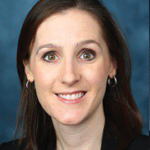
Dr. Lavin
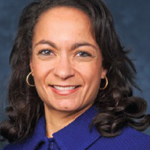
Dr. Thompson
Mentee: Jennifer Lavin, MD, MS, is an attending physician at Ann & Robert H. Lurie Children’s Hospital of Chicago and assistant professor of otolaryngology–head and neck surgery, at Northwestern University Feinberg School of Medicine in Chicago.
Mentor: Dana Thompson, MD, MS, is division head of pediatric otolaryngology at Ann & Robert H. Lurie Children’s Hospital of Chicago and professor of otolaryngology at Northwestern University Feinberg School of Medicine in Chicago.
What is an example of a “little thing” in your relationship with your mentor that has made a lasting impact on you?
JL: Dana became the division head at Lurie after I completed my pediatric otolaryngology rotation during residency, so, despite having trained at Northwestern, my first interaction with her was during my fellowship interview. I’m not sure if she remembers this or not, but during my interview she asked me, “Why do you want to come here for fellowship?” I looked at her and told her, “I don’t. I want to work here.”
I proceeded to explain that I wanted to go elsewhere for fellowship training and to bring a new skill set back with me as faculty. She set down her pen, sat back in her chair, and said, “Okay, what would you bring here as faculty?” I proceeded to tell her what skill set I thought I would add to the division. In hindsight, my proposed skill set was a little naïve, but Dana took the opportunity during that interview to mentor me for the first time. Her advice resonated with me and led me to shift my focus during fellowship and beyond.
DT: Dr. Lavin is an exceptional physician with a strong sense of internal motivation and professional will, combined with strong analytical skills. She demonstrated this even as a resident here at Northwestern. I had matriculated as the division chief of otolaryngology when she was a PGY-4 resident in our training program and after she decided to pursue pediatric otolaryngology. One of the first opportunities for me to interact with her was during her interview for our fellowship program. I was told by others that she “wanted a position” in our fellowship. I specifically remember mentoring her during her interview for fellowship to seek a training experience that would uniquely train her to fill a gap in our division if her desire was to join our team.
While I did not want to influence a direction, I did encourage her to find an area and develop a skill that matched her own perceptions of her skills, strengths, and passion. We were thrilled she chose to seek fellowship training at D.C. National Children’s Hospital, where she was mentored by Rahul Shah, MD, and developed an interest in quality and safety, which was truly a unique contribution and [filled a] gap in our diverse faculty skill set.
When she and I were working through the details of her recruitment package and a business plan, we intentionally created an opportunity for her to have protected time and receive funding to complete a Master’s in healthcare quality and patient safety at Northwestern University. I believe in not only identifying strengths of the mentee, but also creating opportunities to enhance skill, confidence, and application. She has utilized her acquired knowledge and expertise to implement the Surgeon of the Week program in the division, where a dedicated, rotating physician manages the inpatient service and consultations in lieu of outpatient responsibilities. Measured quality metrics from her work demonstrated a significantly reduced time to tracheostomy while maintaining physician productivity and improving physician quality of life. She has also converted all of her process improvement and quality work into scholarly activity and publications. Her ability to do this will be a model for her and other adaptors of integrating PI and QI work into practice in building an academic name and career.
What is the most important aspect of your mentor–mentee relationship?
JL: I would say the most important aspects of my mentor–mentee relationship are an open dialogue and Dana’s ability to recognize my strengths—sometimes before I do. When I started at Lurie, Dana highlighted these strengths and took the time to connect me with everyone I needed to meet to further my goals both clinically and in my role in healthcare quality and patient safety. In talking to young faculty in other departments, [I’ve learned that] this is not something that is universally done, so I’m very thankful. An open dialogue has allowed me to bounce ideas off of her, “mature them,” and then implement them with results that have had a positive impact not only on the division, but also on the entire hospital.
While other professional interactions have helped me reach some of these achievements, the focus in these other relationships has been on the achievement alone and didn’t include a focus on my professional growth.
DT: In general, a mentor–mentee relationship works best for me when the mentee has internal awareness of his/her strengths, skills, and passion and is open to guidance as to how to grow in new directions. I am here to see opportunities and help connect the dots between the mentee, experiences, complementary people, and resources. It is particularly fun to do when your mentee has chosen to grow in an area in which I have little knowledge or a knowledge gap. The challenge for me then is to help that person find their way through self discovery, recognition of how they are growing in skill and knowledge beyond those they work with, and creating the opportunities to hone in on skill and inform the world of all the great work and discovery achieved. Jennifer fits the ideal mentee for me.
My version of success is going to be specific to me and includes, among other things, happiness. —Jennifer Lavin, MD
How do you prioritize the various professional and personal demands in your life?
JL: In general, I try to leave work at work and home at home and to not use either to make excuses for my shortcomings. I’ve been very fortunate to have adequate protected time blocked into my schedule that permits me to do this. I also can’t belittle the fact that I have an incredibly supportive husband of nearly 11 years and a very understanding nanny who loves my 2-year-old son. As far as I can tell, this strategy has worked, but I guess one would have to ask me in a few years to confirm.
I define success at work and at home somewhat differently. At work, it’s a lot easier to look at concrete data such as my clinical outcomes or, in the quality realm, our divisional performance on dashboards. At home, success is a lot more subjective and difficult to define. I do think that having a child has changed my strategy to work-life balance by making me more efficient and [helping me to] realize that it’s possible to set boundaries without falling short of one’s duties.
DT: In three short years, Jennifer has learned and applied lessons of change management that many of us take years to learn and cultivate in real-time application, including myself. I have grown personally and learned by observing her in her early successes. She has demonstrated an ability to bring along others, including many senior to her in experience and years of practice, through careful and precise data analytics, engaging and influencing stakeholders in a matter that was well ahead of her years of clinical practice or administrative experience.
What Have You Learned from a Mentee?
 Dr. Smith: Never stop collaborating.
Dr. Smith: Never stop collaborating.
Many years ago, I was fortunate to meet a critical mentor in my academic development (Ann Nattinger, MD, at Academic Internal Medicine in Wisconsin). She mentored me in the writing of my first R01 in 2002 where she instructed me: “Tim, you’ve got to find quality collaborators around the country if you really want to make an impact.”
After 12 years of successful collaboration and NIH funding, I found myself competing for funding yet again, but my ideas and scientific methodology skills had not kept pace with the cutting edge and I was at risk for losing funding and our clinical research program. Faced with this realization, many scientists would take a sabbatical to gain new vision and learn fresh skills and then apply those to a new grant. But I was a clinical researcher with a robust clinical practice that I loved and just couldn’t walk away from.
Once again, the solution to this challenge rested in collaboration. This time, Zach Soler, MD, an academic rhinologist in South Carolina and my mentee of many years, had gone on to do “our” sabbatical. His critical thinking and additional research training and skill acquisition after his time with me allowed for my “senior” credibility at the NIH to merge with his “junior” fresh and innovative skill set for successful funding of OUR clinical research program! This resulted in Zach’s first R01!
As a mentor, never underestimate the opportunity to be reverse-mentored by one of your mentees. This has been one of the most surprising and satisfying experiences of my career. Thank you, Zach!